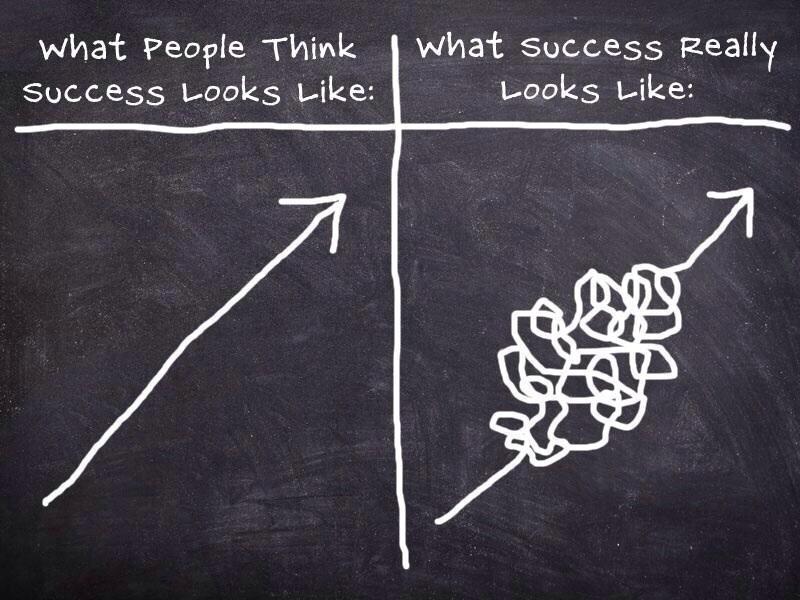Is Grit All It's Cracked Up to Be?
I've promoted the concept called "grit" on this blog in the past...more than once!
What IS grit?
According to Angela Duckworth, who coined the academic usage of the term, it refers to the A) passion and B) persistence to achieve a goal. Both, according to Dr. Duckworth in her widely-viewed TED Talk, are crucial aspects of what she calls "grit."
https://www.linkedin.com/pulse/38-inspiring-quotes-from-angela-duckworths-grit-7-personal-%E5%91%A8%E8%8F%BD%E8%8A%AC-
Very sensible, and very quotable
But...
However, I just saw this academic paper the other day, which argues that grit is a component of a much older, much broader, and much better-studied aspect of personality: conscientiousness. Conscientiousness is one of the so-called "Big Five" personality traits, along with openness, agreeableness, neuroticism, and extraversion [I always thought it was extroversion with an o, but that is apparently an incorrect understanding of the term's Latin root].
For an extensive history and summary of the Big Five and its antecedents, check out this piece. For a much briefer summary, see this (preferably), or this simpler (perhaps too simple) article.
Not buying the hype
There are a couple good critiques of the concept that have been published by journalists in the past year or so. One was published by Slate, and the other by the New Yorker.
- I think most of the New Yorker piece was good, but the author, David Denby, veers way off course about halfway down the webpage. Denby decries an exclusive focus on grit as detrimental to "the creativity and wildness that were once our grace to imagine as part of human existence."
Specifically, he's referring to a list generated by Duckworth and the headmasters of two New York schools. This list was meant to identify aspects of character that could be quantified and measured in those schools.
Nobody is saying that we should browbeat all the creativity, spontaneity, or wildness out of children—that's a straw man argument! It's simply that educators (or, more accurately, school administrators) want to track and measure progress toward specifically-defined, measurable goals. Creativity is notoriously hard to measure, and I'm not sure that teachers should be encouraging wildness in the classroom!
And, for that matter, good luck devising a valid measurement scale for a socially acceptable amount of "wildness" that's a gracious part of human existence!
- Denby objects that the aspects of character listed in that paragraph make for good "corporate drones in a capitalist economy."
- First, that's a misunderstanding of grit: who's going to be passionate (component A of "grit") about completing mundane tasks in order to make somebody else rich?
- Second, it's a misunderstanding of corporate mobility: loyal pencil-pushers with no creativity might rise to middle management with a nice salary, but nobody will actually follow a drab office drone. Such people are not leaders, and therefore will never achieve the pinnacles of success that Duckworth is trying to understand.
Put another way: being the kind of passive, obedient employee that Denby imagines may get you a few promotions, but it will never get you to the very top of a company!
And elsewhere in the same article, the author mentions several luminaries that Duckworth discussed in her book. Clearly, she's not interested in "corporate drones" who are content to punch the clock for 40 years before accepting a pension and quietly wasting away in front of a TV in their golden years!
- Third, it's a misunderstanding of capitalism: show me a successful, dynamic company whose founder lacks any sort of creativity, spontaneity, or insight!
Capitalism succeeds by handsomely rewarding those who take risks, those who provide something that customers value...even if customers didn't realize how useful it would be until they started to use it!
Most (if not all) successful entrepreneurs have a big dream—a vision of how their work can improve the lives of their customers, perhaps even transform an industry, and thereby make the world a safer/happier/more productive place! And that is how they convince their employees to put forth their best efforts: they have a goal that employees think is worth working toward!
So, is Dr. Duckworth wrong to talk about grit?
The short answer is, "no." Grit can certainly be a good predictor of achievement, at least under certain conditions (like when there's not much difference between individuals in raw ability, or "talent").
The longer answer is: while grit may be a good predictor of achievement, there's no good evidence that it's any better than existing predictors, such as conscientiousness or IQ. In fact, that meta-analysis shows that perseverance alone is actually a better predictor of achievement than the "grit" score that's a composite of perseverance and consistency of effort!
And in those studies where grit does look better than existing predictors, that's probably because of subtle biases in the research design, such as using a sample of already high-achieving students (such as Ivy League college students)—subtle, but fatal nonetheless.
Moreover, too much focus on grit may have adverse effects on your health, and even on achievement! Think of someone who doubles down on a plan that doesn't work, rather than scrapping it in favor of a revised approach.
So, why bother to write this, then? Just ignore your error and move on, like everyone else does...
In 2015, I discovered that one of my posts contained an error (in my defense, I was simply sharing other people's "reporting"—but that doesn't absolve me of the responsibility to critically evaluate what I read, rather than just being a parrot!).
As I did then, I'm taking responsibility for my earlier mistake, and trying to limit the damage that my posts have done.
How's that for character, David Denby? 😉




No comments:
Post a Comment